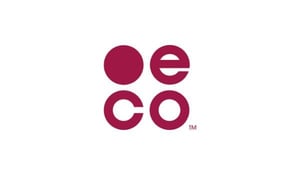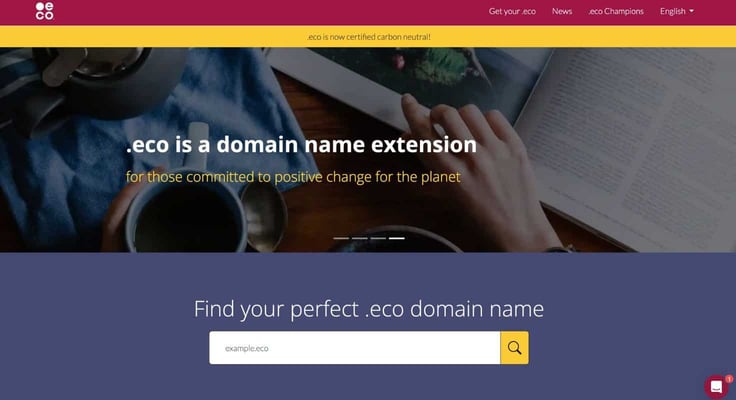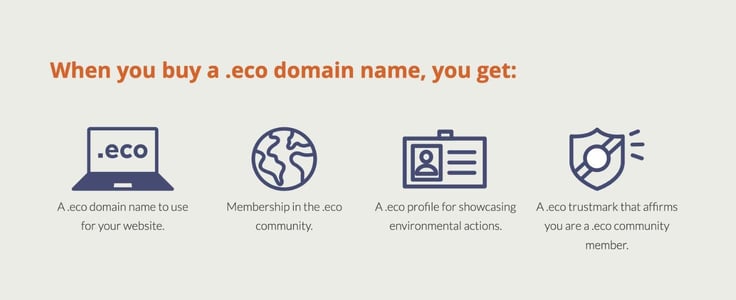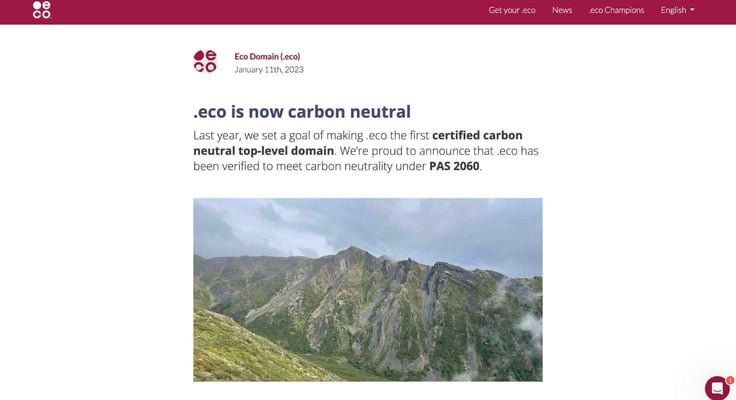
TL; DR: Carbon emissions have caused irreversible change to our climate. Unfortunately, technology is playing a role in increasing that impact. Thankfully, more businesses are becoming aware of this and are making conscious efforts to reduce their carbon footprint. .eco is a domain registry leading the charge in curbing the impact of the domain industry and the internet on the planet. It stewards the registration process of the .eco extension, ensuring only users committed to environmental action can register. We spoke with Owen Rogers, CTO of .eco, about the organization’s green initiatives and thoughtful domain registration process.
We often don’t make the connection between our use of technology and environmental impact. I can be the first to say that I’m guilty of it. I usually don’t think about servers when watching hours of “The Office” on Peacock or while I’m browsing the internet for basketball memes. But that doesn’t mean the data centers powering these services don’t exist.
It’s like the saying “If a tree falls in the forest and no one is there to hear, does it make a sound?” The internet seems to be everywhere but also nowhere at all because we can’t physically see it. But its invisibility doesn’t make it impossible for us to curb its effects on our planet. The everyday consumer can make more conscious buying decisions while businesses and organizations can take various steps to reduce their carbon emissions and influence climate change within the technology sphere.

But there are people out there already doing the work for us. Organizations such as .eco are raising awareness, educating companies, and setting an example for brands to follow eco-friendly standards within their operations. .eco is the domain registry that manages the domain database of the top-level domain extension, .eco.
“We were established as a community top-level domain, specifically dedicated to the global environmental community. So what we see as part of our role is raising awareness about the environment and the climate impact associated with using technology and websites on the internet,” said Owen Rogers, CTO of .eco.
Companies that want to register a .eco extension must take a pledge to commit themselves to environmental action and present qualifications that show their eco-friendly status. .eco works tirelessly to ensure the best practices within its registry and uses its platform to spread awareness among the business community and the general public.
At the Intersection of Sustainability and Technology
As a domain registry, .eco lies at the intersection of sustainability and technology. It plays a role in facilitating one of the most critical systems on the internet but also has a duty to uphold and promote green practices. Its work as .eco helps combine these efforts to create positive change for our planet, addressing some of the most harmful problems, such as greenwashing and unbridled, inefficient use of technology.
“Many people don’t necessarily know much about the internet and how the use of technology has an environmental impact. So we try and help steer the members of the community in a positive direction,” said Owen.

.eco works with the business community and the public to inform them of techniques they can use to reduce their carbon footprint. For example, .eco has a guide for website owners on ways to make their website eco-friendly. It also discusses the climate impact of a domain name.
Pulling up a domain name requires multiple servers and other hardware working together to direct the process. These servers leave behind a carbon trail. .eco pushes users to manage their domain’s carbon footprint by selecting a carbon-neutral DNS provider and web host.
“We provide guidance for the community and the public at large about good sustainability choices with regard to technology selection. So we see ourselves in a position to help promote green hosting providers and guide new domain registrants looking to set up a website in that direction,” said Owen.
Aligning Brand Missions With Domain Names
Branding is at the center of a business’s reputation and mission. It distinguishes a company from its competitors, communicates its identity to consumers, and builds pride within the workplace. Choosing a proper domain name is an essential piece of the branding strategy. So it’s no surprise eco-friendly companies would want a name to display their commitment to the planet. This is where .eco steps in.
“The internet is a fantastic way to get the message out about the good work businesses and nonprofits do in their day-to-day work. So .eco is a clear signifier for them as part of their brand to identify their alignment with the environmental movement,” said Owen.
When .eco launched, the founders assembled a coalition of leading environmental nonprofit and intergovernmental organizations, including WWF and UNEP, to draft its policies. Through these policies, .eco has set up eligibility criteria to ensure users signing up for a .eco domain name are championing efforts to help the enivornment.

“Before anyone can use a .eco domain name, they need to create a web profile. A .eco profile is a simple online profile that provides information about the sustainability characteristics and commitments of the organization,” said Owen.
.eco’s responsible stewardship has helped deter users with harmful intentions and keep the environmental movement genuine. Its process includes a few requirements. Since .eco supports the UN’s sustainable development goals, applicants must identify which of these 17 goals they are working toward as part of their business and disclose other information such as business location. Users must also take a pledge.
“Every person takes a pledge committing them to environmental action and ensuring that the information on their website is accurate and truthful. If there are people using .eco domain names who are contrary to that, then through our compliance process, they could potentially lose access to their domain,” said Owen.
Promoting Carbon Neutrality and Other Green Standards
While .eco isn’t supervising its domain registration process, it is focused on promoting green standards within its own doors. The .eco team takes various measures to establish and maintain an environmentally friendly and transparent culture. Some of these actions include measuring and publishing its carbon footprint annually, optimizing its digital infrastructure for efficiency, and investing in offset projects.
.eco also reached a major milestone in January 2023. “We achieved certified carbon neutrality under PAS 2060, a global standard for carbon neutrality. We had a third party conduct an audit calculating our carbon footprint to ISO standards,” said Owen.

.eco set a goal in 2022 and became the first certified carbon-neutral top-level domain this year. Owen said .eco is the only extension making this type of commitment to improve the environment. The domain registry also accounts for its residual impact by purchasing high-quality carbon offsets.
“Unlike a lot of other registries, we are independent and only deal with .eco. There’s been tremendous consolidation in the TLD space. But for us, we are completely focused, dedicated, and passionate about supporting the global environmental community,” said Owen.
As for other green initiatives in the pipeline, .eco is in the process of becoming certified as a B Corp. “It’s a further way for us to demonstrate to the community that we are trying our best in terms of social responsibility and environmental responsibility. The B Corp community is closely aligned with the environmental community. So for us, it’s a natural fit,” said Owen.


